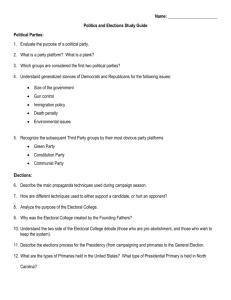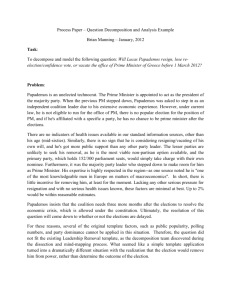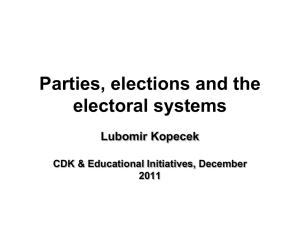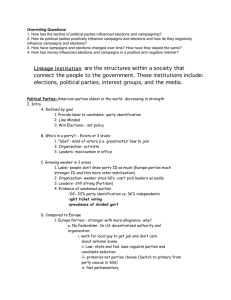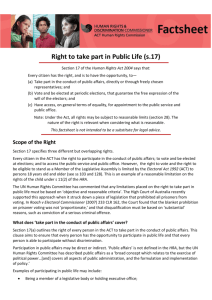The Minister of Interior, Tassos Giannitsis` interview in the newspaper
advertisement
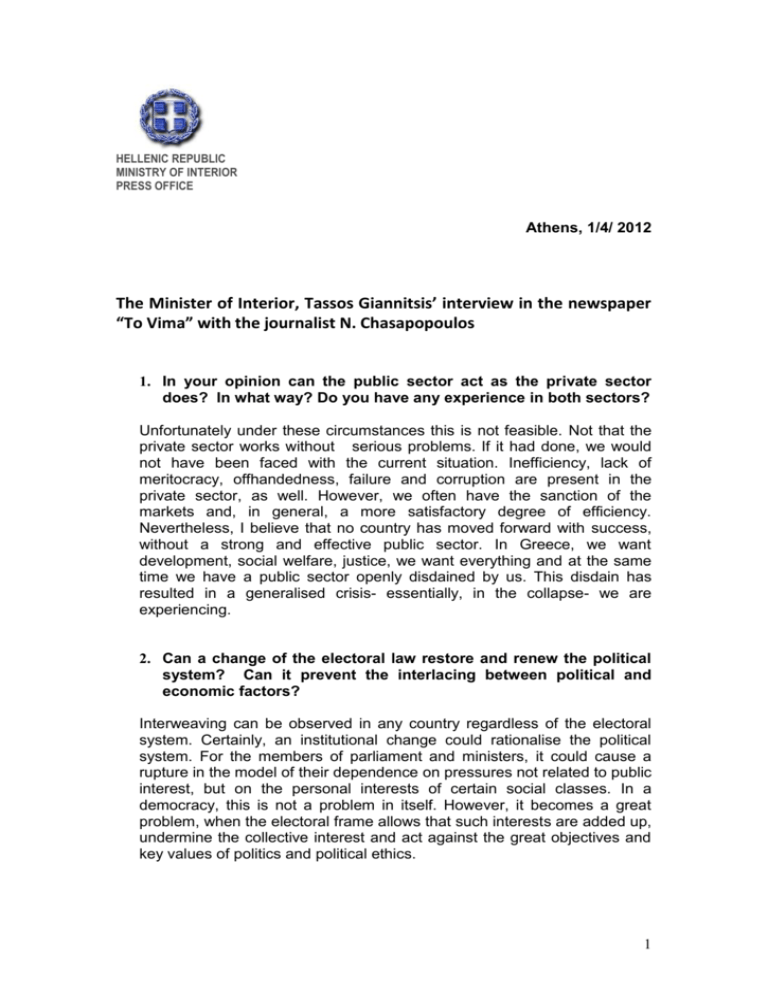
HELLENIC REPUBLIC MINISTRY OF INTERIOR PRESS OFFICE Athens, 1/4/ 2012 The Minister of Interior, Tassos Giannitsis’ interview in the newspaper “To Vima” with the journalist N. Chasapopoulos 1. In your opinion can the public sector act as the private sector does? In what way? Do you have any experience in both sectors? Unfortunately under these circumstances this is not feasible. Not that the private sector works without serious problems. If it had done, we would not have been faced with the current situation. Inefficiency, lack of meritocracy, offhandedness, failure and corruption are present in the private sector, as well. However, we often have the sanction of the markets and, in general, a more satisfactory degree of efficiency. Nevertheless, I believe that no country has moved forward with success, without a strong and effective public sector. In Greece, we want development, social welfare, justice, we want everything and at the same time we have a public sector openly disdained by us. This disdain has resulted in a generalised crisis- essentially, in the collapse- we are experiencing. 2. Can a change of the electoral law restore and renew the political system? Can it prevent the interlacing between political and economic factors? Interweaving can be observed in any country regardless of the electoral system. Certainly, an institutional change could rationalise the political system. For the members of parliament and ministers, it could cause a rupture in the model of their dependence on pressures not related to public interest, but on the personal interests of certain social classes. In a democracy, this is not a problem in itself. However, it becomes a great problem, when the electoral frame allows that such interests are added up, undermine the collective interest and act against the great objectives and key values of politics and political ethics. 1 3. According to media publications you would be the Minister of Finance, replacing Mr. Venizelos. We have seen reports according t o which some people were afraid of you, they were more afraid of a yeast establishing a “Papademos party”. How close to reality were all these? I do not care about all this backstage chatter. To be clear, before the decisions were made I had a contact with the Prime Minister. My position was that I had no problem about three solutions: to be replaced before elections, to remain in the Ministry of Interior until the elections, to be moved to the Ministry of Finance, if he considered it necessary, although this solution had many risks for me and for the future. I am glad he did not opt for the last solution. As far as the fears for a Papademos party are concerned, the best way to overcome the fears is to speak with real sincerity and address efficiently the problems created by the crisis. “Efficiently” means with courage, pragmatism, a mood of transcendence and looking to the future, what I could refer as “the big” future not “the small” future. In other words, what the prime minister has been doing during all these months. 4. What do you think about the positions developed by the Troika in the European Parliament? Can we continue with a severe internal devaluation? Internal devaluation has its limits and requires a delicate balance. It is difficult to distinguish when the policy followed is self annulling because it exceeds the limits and when it is nullified because it can not work effectively. We neither took seriously the crisis, nor implemented our commitments, nor developed our own alternative visionary strategy. 5. What should be the first priorities of the new government after elections? To build the confidence of the international community in Greek politics, the confidence of the Greek society in the government policy, the confidence of unemployed people in relation to measures to tackle unemployment, and the confidence of investors in the political and economic prospects. It is the main precondition of success for all policies. Also to seek a change in balance in relation to the growth , not in the sense of a credit or fiscal laxity which is not feasible, but though modernising the state, making use of resources for investment purposes, eliminating intransparency, improving productivity, attracting international investments and implementing other changes which will create a cumulative favourable development climate. 2 6. Can the country expect better prospects from the Memorandum 2 and in what way? Can it expect a change in the correlation of political forces in Europe and a revision of the policy followed by MerkelSarkozy? I think that the onus is on our own ability to act. Let us not wait for solutions to come from international correlations which will not change many things. Our future can not always rely on foreign forces. 7. How ready is the state machinery for elections? How much will the elections cost? Can the state afford the cost of by-elections if a single party government does not get elected? Considering that each election costs 60-70 million € and that in order to have 320 million € we reduced pensions and other costs, people can make their own choices. Of course, democracy is not measured in this way but we can not remain indifferent to its costs, either. 8. What do you think about the rise in polls of the extreme right wing parties? It is a sign of political and ideological weakness 9. Is there still room for a new political party and under what conditions? There is always room for new ideas, new political proposals and new people. What really matters is whether in the phase of the crisis a new perception of the modern world, convincing answers to crucial questions and wider future prospects can be highlighted. It is indifferent to the society if they will be expressed by the existing parties or by new ones. What is important is not the colour of the cat but whether it catches mice. 10. Do you feel vindicated in relation to the developments evolved about the insurance system after 2001? It is not a matter of vindication. What is important is its impact on the current situation. When we send crucial problems on the podium, we pay too high a price which is massive, unjust and multiple. Let us have a look at the current problems, the health system, the unemployment, environmental issues, development issues, the state reform, corruption and let us think about the lessons learned from the developments in relation to the insurance system. 3 11. Theodoros Pangalos was among the people who disagreed with you and requested your dismissal from the government. Today what would you say to him? In a humorous mood, I would thank him wholeheartedly. If the insurance reform had been passed then, people would have thought of me as a heartless man, a technocrat without any social sensitivity, a man who does not understand politics, who destroyed the pension system and deconstructed a strategic social pillar. Fortunately for me but unfortunately for the country the reform did not pass. However, I had then accepted in practice to bear the burden of the insurance reform, in order to prevent the reality we are experiencing today. . 4

